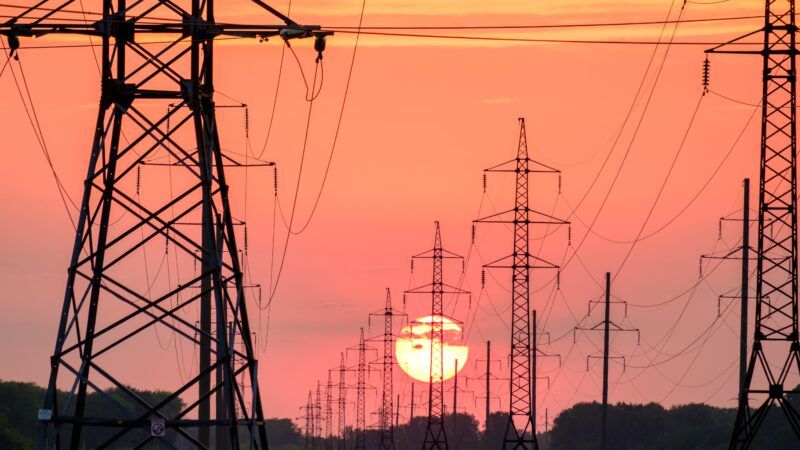If Sanders and Warren Think Climate Change Is an Emergency, Why Are They Against These Green Energy Reforms?
If climate change is an emergency that requires immediate action, it makes sense to streamline environmental reviews that tangle green energy projects in red tape.

In July, a group of progressive senators sent a letter to President Joe Biden urging the immediate declaration of climate change as a national emergency.
"Declaring the climate crisis a national emergency…would unlock powers to rebuild a better economy with significant, concrete actions," the senators wrote. "The climate crisis is one of the biggest emergencies that our country has ever faced and time is running out."
The letter was signed by nine senators, among them Cory Booker (D–N.J.), Edward Markey (D–Mass.), Bernie Sanders (I–Vt.), and Elizabeth Warren (D–Mass.).
"We cannot allow a single Senator to stall our progress," they wrote—a not-so-veiled reference to their colleague, Sen. Joe Manchin (D–W.Va.), who has been wrongly castigated by progressives for single-handedly blocking bills that, in actuality, face opposition from a majority of the Senate.
Now, there's a bill before the Senate that would take concrete actions to speed the deployment of green energy projects that aim to combat the carbon emissions blamed for climate change. Manchin is sponsoring the bill—and you can probably guess where Booker, Markey, Sanders, and Warren are lining up.
The permitting reform proposal that Manchin is trying to attach to an upcoming must-pass government funding bill is a sprawling piece of legislation that aims to accomplish many things. But perhaps the most important part of the proposal is a series of deadlines that would be created to prevent the often lengthy delays that befall large infrastructure projects—including green energy projects. The bill would impose a two-year limit on National Environmental Policy Act (NEPA) reviews, would require permits to be issued within 180 days after the conclusion of a NEPA review, and would impose a 150-day statute of limitations for lawsuits challenging those projects.
As Reason's Christian Britschgi has detailed, the NEPA review process was created in 1970 to ensure that the environmental impact of infrastructure projects like power plants and highways was considered. That's important, but the process takes far too long: The average NEPA review now takes more than four years. Unsurprisingly, the complex bureaucratic process has become a tool for anti-growth and NIMBY activists—who also love to file time-consuming lawsuits challenging new construction—while driving up the cost of infrastructure projects.
Manchin's proposal, therefore, can be thought of as something akin to a pitch clock for big building projects.
If you're someone who views climate change as an existential crisis, these changes should be great news. After all, the key to reducing America's reliance on carbon-intensive energy sources is to get more green energy projects of all kinds online quickly. Government permitting schemes are the single biggest stumbling block to doing that—right now, the U.S. has offshore wind projects capable of generating 42 megawatts (MW) of electricity, while another 18,581 MW of potential offshore wind power are tied up in permitting battles, according to Department of Energy data. Construction on what could be a massive offshore wind farm in Massachusetts has been held up for years due to NEPA reviews.
So where do Booker, Markey, Sanders, and Warren stand? On Thursday, they were four of the eight senators to sign a letter to Senate Majority Leader Chuck Schumer (D–N.Y.) opposing Machin's proposal on the grounds that it would speed up those permitting decisions.
"Changes to the permitting process should strengthen—not steamroll—public participation," the senators wrote.
That is, of course, the opposite of what is necessary during a true emergency. Though they do not admit as much in the letter, "strengthening" public participation in the permitting process would mean more bureaucracy, more meetings, slower approvals, and fewer new projects being completed.
Here's what that looks like as a practical matter. A recent Princeton study found that 80 percent of the potential emissions reductions from projects funded by the Inflation Reduction Act would be lost without an expansion of transmission lines. In short, you need more electricity infrastructure to connect renewable energy power plants to parts of the country where coal- and gas-powered plants are operating. Building those transmission lines requires cutting down trees, crossing wetlands, and potentially disturbing the habitats of spotted salamanders.
But if climate change is an emergency, maybe the salamanders can be expected to give way?
Unfortunately, that's not the way Congress is leaning. Along with the eight senators who signed the letter to Schumer, more than 70 House Democrats sent a letter to Speaker of the House Nancy Pelosi (D–Calif.) opposing Manchin's proposal because it "attempts to short-circuit or undermine [NEPA] in the name of 'reform.'"
You can believe it is vitally important to build green energy infrastructure as quickly as possible in order to combat climate change, or you can believe that waiting four years for an environmental review is essential. Lawmakers trying to have it both ways are accomplishing nothing.


Show Comments (168)